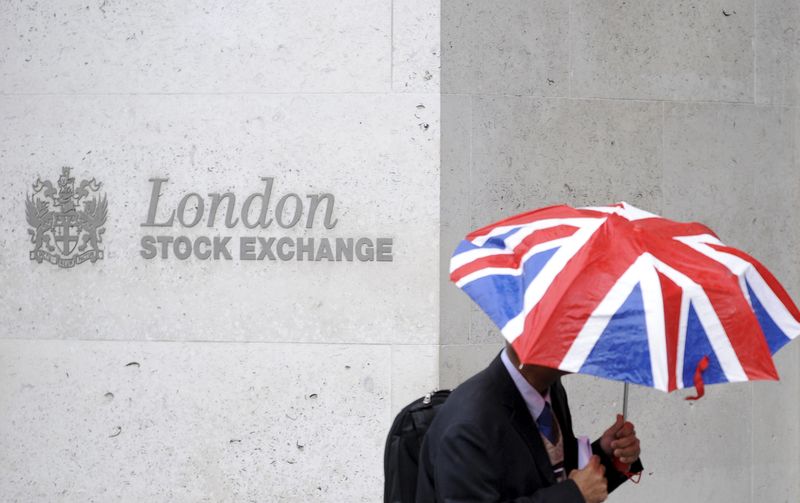By Claire Milhench
LONDON (Reuters) - UK-based investors boosted equity holdings to two-year highs in September, citing the upswing in world growth but expectations of interest rate rises in the United States and Britain prompted them to cut bond exposure to the lowest in 15 months.
Reuters' monthly poll of 15 UK-based asset managers was carried out between Sept. 15-27, just after the Bank of England said it was likely to raise interest rates if the economy and price pressures keep growing.
The U.S. Federal Reserve also signaled one more rate rise before the end of the year, despite low inflation.
But global stock markets (MIWD00000PUS) shrugged off the rate rise signals, hitting record highs in September for year-to-date gains of 15 percent. The Dow Jones (DJI) is set to end the quarter up almost 5 percent whilst the S&P 500 (SPX) has gained 3.5 percent.
Poll respondents broadly rotated into stocks and out of bonds, boosting equity holdings by 2.5 percentage points over the month to 53.4 percent of their global balanced portfolios. Bond holdings fell by 2.4 percentage points to 26.6 percent.
Overall equity exposure was at its highest since August 2015, with allocations having risen by 6 percentage points since the start of 2017, whilst bonds dipped to lows not seen since June 2016.
"Understandably, equities are not as cheap as they once were, but they offer investors much better value than sovereign bonds which look toxic under the storm clouds of predicted higher interest rates and rising inflation," said Peter Lowman, chief investment officer of wealth manager Investment Quorum.
Kamil Amin, investment strategist at Charles Stanley, also expressed a preference for equities over bonds, citing valuations, risk premia and the outlook for the global economy.
Within equity portfolios, investors raised their U.S. exposure to 32.8 percent, up 2.9 percentage points from August to the highest level since February.
The U.S. equity rally is being driven by excitement around technology companies as well as tax reform hopes, although some managers highlighted a stand-off with nuclear-armed North Korea as a concern.
"We have to be mindful of the elevated risk that an unforeseen shock might have, due to the strong performance of equities over the last few years," said Jonathan Webster-Smith, head of multi asset team at Brooks Macdonald.
BREXIT UNCERTAINTY
Investors remain bullish on the euro zone, raising exposure to European stocks to 17.3 percent, but the allocation to UK equities slipped to 23.6 percent amid continued uncertainty over Brexit.
In mid-September, Bank of England Governor Mark Carney said Brexit was likely to hurt Britain's growth prospects in the short term and push up inflation as the country adjusts to life outside the European Union.
Not surprisingly then, some 60 percent of poll participants who answered a question on the Bank of England thought it would raise rates before year-end.
But some managers such as Trevor Greetham, head of multi-asset at Royal London Asset Management, stressed a rise would merely reverse the emergency rate cut the Bank made immediately after Britain's June 2016 referendum on EU membership.
"The Bank is probably concerned that the pound will weaken further when U.S. interest rates next rise and has only a small window before UK inflation starts to drop and Brexit uncertainty picks up again," Greetham said.
With regulators cracking down on virtual money, 80 percent of poll participants who answered a question on Bitcoin and other cryptocurrencies said these had no place in a modern investment portfolio.
"Cyptocurrencies need to be regulated before they can be held at a custodian, which is a precondition for their inclusion in institutional portfolios," said Thomas McDonald, a portfolio manager at Russell Investments.
Rob Pemberton, investment director at HFM Columbus, was also unpersuaded: "Maybe I'm just too old-fashioned but cryptocurrencies look more like a speculation than investment to me."
